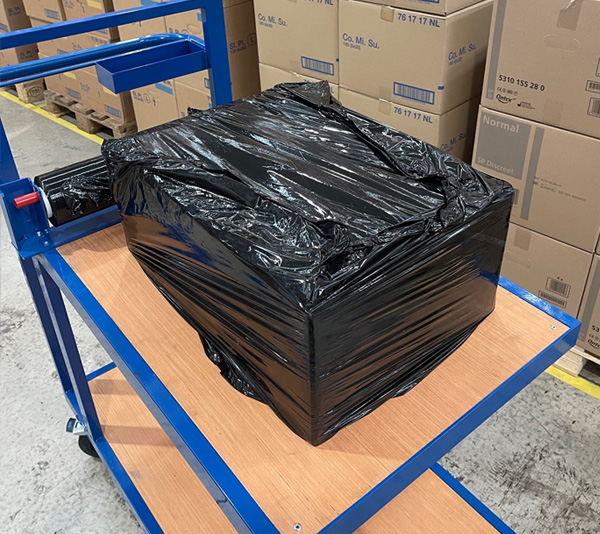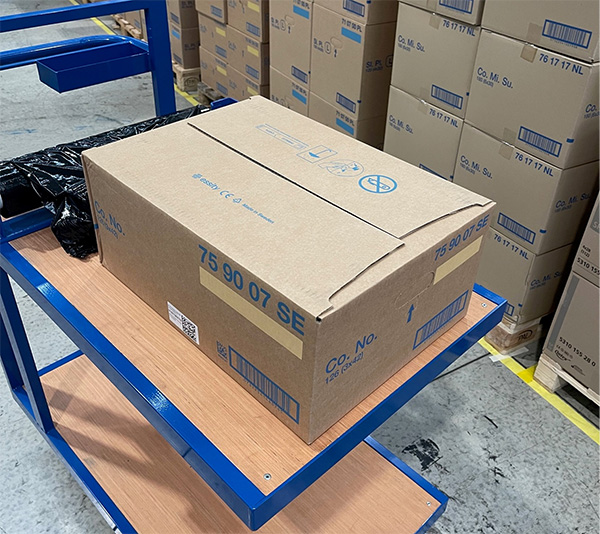Reducing Plastic Waste While Ensuring Patient Confidentiality
19.5
tonnes of CO2 equivalent (tCO2e) saved
7.5
tonnes of single use plastic wrap removed
400,000 +
continence products delivered each year
Overview
Every year, NHS Supply Chain’s Home Delivery Service delivers more than 400,000 continence products to patients living in their own homes or in care homes.
To ensure patient confidentiality during the delivery process, continence products have traditionally had a low-density polyethylene (LDPE) plastic wrapping, also known as privacy wrap, added around product boxes.
The NHS accounts for approximately 40% of public sector emissions and 62% of this carbon footprint comes from the supply chain. The carbon footprint of NHS England in 2019 totalled 24.9 million tonnes of carbon dioxide equivalent (CO2e). In October 2020, the NHS became the world’s first health service to make a Net Zero commitment.
As part of its commitment to delivering this target, NHS Supply Chain, working with NHS community trusts, carried out a project to reduce the plastic wrapping used on continence products.
After seven months it has already delivered an estimated reduction of 19.494 tonnes of CO2 equivalent, with more predicted in the future.
Objectives
- Engage and partner with NHS community trusts to reduce the carbon footprint of packaging for continence products being delivered to patient’s homes.
- To ensure patient dignity and confidentiality is not compromised by any changes to packaging.
The Challenge
Continence products delivered through NHS Supply Chain’s Home Delivery Service have in the past been delivered in packs within an outer carton.
Details identifying the contents as continence products were often visible on the outer carton which had the potential to cause distress and embarrassment to patients should neighbours take delivery of the product on their behalf.
As patient dignity is a key priority for all NHS community trusts additional plastic privacy wrapping was requested to mask the product information.
The project sought to find a way to reduce plastic packaging while ensuring patient confidentiality was maintained.
The Process
Working with our suppliers over time, the external product information identifying the contents as continence products was removed from the boxes on virtually all lines.
However, many NHS community trusts continued to use privacy wrap even though there was no longer a need.
The LDPE plastic used in privacy wrap is particularly difficult to recycle in kerbside collections at home, meaning most ended up in non-recyclable waste going to landfill.
Identifying an opportunity to reduce plastic waste and make a positive contribution to the sustainability goals of both NHS Supply Chain and our customers, a project to remove plastic from this area of the supply chain was initiated with our warehouse partner Unipart and delivery partner Movianto.
The Solution
We gathered data demonstrating the current practice and in February 2023, our Home Delivery Service (HDS) Account Support Managers, used this to engage and communicate with targeted trusts to highlight the sustainability benefits of removing the plastic wraps.
The data demonstrated how this could support both NHS Supply Chain and trust sustainability targets and assist the NHS on its journey to achieve Net Zero.

The Result
The initiative, and the rationale behind it, was widely welcomed by many trusts and following the initial discussions, the Northern Care Alliance NHS Foundation Trust and Oxford Health NHS Foundation Trust became the first trusts to adopt the new approach in March 2023.
Since then, a further 44 out of 55 trusts have joined the programme and allowed HDS to remove privacy wrapping, with four more trusts currently in the process of doing the same.
As a result, the Home Delivery Service has demonstrated an estimated saving of 19.494 tCO2e¹ so far, with 80% of trusts removing the use of privacy wrap².
This has the potential to increase to 24.368 tCO2e should all privacy wraps be removed.
This is a significant and positive contribution to lowering the carbon footprint of NHS Supply Chain and its customers.

¹ Based on 9.37 tonnes of privacy wrap purchased in the previous year reducing by 80%, leaving 7.496 tonnes of LDPE plastic wrap. This multiplied by the June 2022 UK conversion factor for virgin plastics (2.60064) equates to an estimated 19.494tCO2e reduction.
² Assumptions made that 20% of customers still require privacy wrap.
Useful Links
-
Greenhouse Gas Reporting: Conversion Factors 2022
Emission conversion factors for use by UK and international organisations to report on 2022 greenhouse gas emissions.
